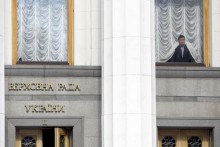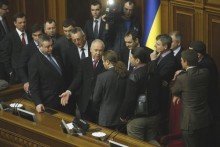While everyone guessed complex maneuvers by which the Party of Regions would ensure the process of adopting the right decisions in the parliament (voluntary dissolution, referendum, etc.), the ruling party chose the simplest way. On April 4 the Party of Regions, the Communist Party, and some independent MPs gathered on Bankova Street near the Presidential Administration and declared their meeting to be a session of the parliament. They even adopted a number of decisions.
Here is what was happening meantime in the building of the parliament on Hrushevskoho Street 5. Opposition had to stop doing one of their most favorite things – blocking the podium and make some decision right on the spot. As a result, they did not come up with anything new and, thus, chose the old proven way – announced another rally. First the rally was planned on Saturday and then it was postponed until Sunday.
By the way, the same day the faction Fatherland lost a few of its “bayonets.” Speaker Volodymyr Rybak, who presided the session on Bankova Street, read the statements of MPs (Oleh Kanivets, Vitalii Nemylostyvy, Roman Stadniichuk, and Ihor Skosar) that they no longer wish to be a part of the Fatherland faction. However, later the opposition said that the MPs have written statements of withdrawal of their previous declaration of leaving the faction. After that, Nemylostyvy and Stadniichuk appeared at the majority session. The situation has to become clearer soon.
What does Europe think about the recent events in Ukraine? “We are closely monitoring the situation, checking the information, and at this stage are not going to make any comments,” Peter STANO, representative of the European Commission for Enlargement and Neighborhood Policy, told The Day.
What is the bottom line? Opposition got carried away from blocking the parliament and organizing rallies, while the government would not abandon the practice of sole control. Inability or unwillingness to compromise creates permanent scandals. As a result, the country once again loses its reputation.
The Day spoke with Viktor MUSIIAKA, People’s Deputy of second convocation of the Ukrainian parliament and Law Professor.
What is your opinion of the events that took place on April 4?
“In a situation like this we need to refer to the Law on the Rules of Procedure. Did the parliamentary majority have a right to hold the session of the parliament elsewhere? In 2000 there was already a precedent of holding a parliament session outside the parliament building on Hrushevskoho Street 5 in the Ukrainian Home. Then the Constitutional Court said that the parliament is entitled to make decisions regarding this on its own, which it did when the amendments to the Law on Regulations were introduced according to which the parliament may decide to hold a meeting outside Hrushevskoho Street 5. But the thing here is that such decision has to be made by the entire parliament and not only a part of deputies or the parliamentary majority. The latter has this right but such decision has to be made during the parliament session and not somewhere else. Moreover, on April 4 we saw that opposition MPs were not allowed into the room where the majority held their meeting. Then there is no way it could be a rightful session of the parliament.
“We can’t take it all seriously. There was no legitimate session of the parliament that day. I think that it should be seen as a signal of the majority to the opposition that they need to find a way out of a deadlock. On the other hand, perhaps, such actions of the majority are aimed at more distant conceptual goals. I am sure that they adopted the Law on Referendum not by chance, and not by chance Oleksandr Yefremov expressed the idea that such parliament is incapable of working adequately and, therefore, they must ask people. Moreover, he also suggested that the number of the MPs should be reduced and that only majority election system should be introduced. It is all clear. In this situation it is possible to hold a referendum, then create the conditions for the dissolution of the parliament and finally set the date of the early elections. Then the new parliament will be able to adopt changes to the Constitution.”
According to you, the parliamentary majority acted unlawfully. And what do you think about the actions of the opposition?
“Opposition has to understand at last what work of the parliament means. If you represent the opposition, you have to defend your rights. For example, the parliament has not passed a decision on pension reform recently, then you have to negotiate, search for votes – work on. If every time they follow the logic – ‘you did not vote for our proposals then we will block the podium’ this will no longer be a parliament. There is a majority there. It is clear that you [opposition. – Author] represent the interests of the people, but you have to demonstrate it by using other methods. There is only one form of political struggle – the elections. And now, if you received seats in the parliament, go and work, continue to stand up for your beliefs within the limits of parliamentary procedure.”
Do you agree that both the opposition and the government must give way: opposition has to stop at last and the ruling party has to make a step to meet?
“Of course. Events like this should indicate that a choice must be given: either the parliament starts working (parties look for a compromise) or go into new elections. What can be a compromise? For me, a good example of finding common language could be a decision of the parliament on the elections in Kyiv. There are many reasons for this to be done. I, for example, submitted my proposals. There is no need for a decision of the Constitutional Court. Everything can be done peacefully after all the appropriate justification is prepared. This could be a good example of a compromise. Today we can see that many Ukrainian MPs haven’t matured enough to realize the fact that they work in the Ukrainian parliament.”









